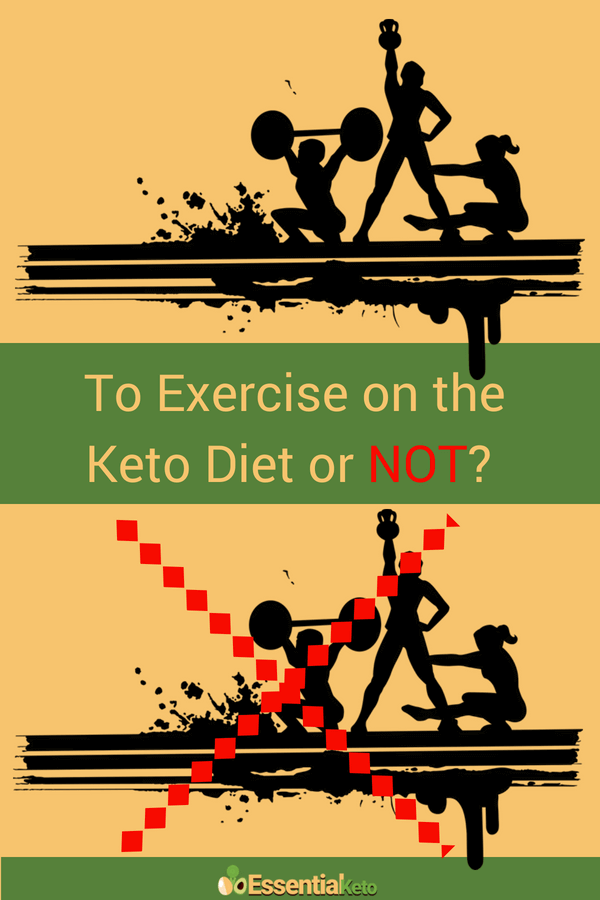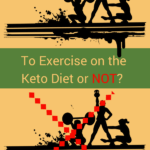Keto Diet and Exercise – Should I Exercise on a Ketogenic Diet?
Should I Exercise on a Ketogenic Diet?
Yes and No!

If you are just starting out on a ketogenic diet and you don’t normally exercise, then NO.
When you just start out, you are likely to have some keto flu symptoms. Get through this period first.
Then YES, definitely incorporate exercise into your life!
Once your body becomes fat adapted, you may find that you have much more energy anyway and actually want to exercise. 🙂 I know this may sound hard to believe if you normally don’t have the energy or the desire to exercise.
If you have always exercised, then YES!
You definitely want to continue to exercise. If, however you initially feel a little weaker than normal, just listen to your body and slow down for a bit. Your energy will return.
We all know exercise is important no matter what eating plan or lifestyle we follow. However, exercise can be way more efficient when following a ketogenic diet compared to a high carb diet. As a sweetener, the results achieved from exercise whilst fat burning can be much better.
Just remember, that you cannot “out exercise” bad eating. Eating good healthy and nutritious food always has to be the starting point if you want to change your life. It is your diet that essentially supply the building blocks for your desired outcome.
Are you interested to know exactly how exercise can support you while on the ketogenic diet? Then read on and find out...
Should I exercise on a keto diet - yes or no? Get the definitive answer here...
Some Reasons to Exercise
Exercise Improves Insulin Sensitivity
Unfortunately, for many of us, insulin sensitivity decreases as we age and many of us become less active.
Inactive people are more likely to have elevated levels of blood glucose. They tend to have higher levels of insulin secretion over the course of a day and as result have excess body fat.
This is also the first step on the way to metabolic syndrome and may lead to pre-diabetes. Or ultimately diabetes.
And unfortunately in today’s world, these problems are no longer limited to older people. Insulin sensitivity and resistance starts younger and younger.
Exercise, especially weight bearing, anaerobic activity has been shown to improve the efficiency of insulin in response to blood glucose.
When following a ketogenic diet, blood glucose levels and glycogen stores are lowered.
This supports the body to better handle small bursts of glucose either from ingesting them or produced through the krebs cycle.
Fat Burning is Amplified
One of the biggest benefits of a ketogenic diet, is its noticeable effect on fat metabolism.
In the absence of carbohydrates, insulin’s activity is markedly decreased, paving the way for significantly increased levels of lipolysis.
When insulin levels are high, fat burning slows down and fat is stored. If you exercise when insulin levels are high, the body will utilize carbohydrates for energy. If however your insulin levels are low, your body can use the fat stores as energy.
We have way more fat stores, so when your body efficiently burns fat for energy, you should always ave enough energy during moderate exercise.
It is therefore obvious that exercise is more effective if your body is in a state of ketosis and burning fat or ketones rather than glycogen.
Exercise Promotes Muscle Gain
Why is muscle growth important?
We need muscles to burn fat. The more muscle we have, the more fat we can burn even when we are not active.
So, it is important to keep exercising to maintain muscle mass as the old adage, “use it or lose it” is very much true.
Not following a strict ketogenic diet?
The ketogenic diet is really different for every person and even if you follow a version that is not as strict, you will still reap the benefits.
There are also types of keto diets that are friendlier towards endurance athletes and bodybuilders.
READ - Ketogenic Diet for Bodybuilding
One way to make sure that you exercise when your glucose levels are low is to exercise first thing in the morning on an empty stomach.
Before breakfast your body is forced to burn fat for energy, as glucose levels are depleted following 6 to 10 hours of fasting during the night.
No wonder then that this is the preferred time that many athletes perform cardiovascular exercise as it amplifies fat metabolism.
Tweaking Keto
There are keto adaptations for endurance athletes, bodybuilders and others who prefer to carb load before or during exercise.
The two main options are a cyclical ketogenic diet and a targeted ketogenic diet. What are they?
Cyclical Ketogenic Diet
Sport stars on this diet follow a normal keto diet for 5 days and then they carbo load for two days. For a complete cyclical ketogenic diet plan, check out our detailed guide.
Targeted Ketogenic Diet
With this adaptation, athletes carbo load shortly before workouts and then follow a standard ketogenic diet for the rest of the time.
Conclusion
Want to get the maximum benefit from your ketogenic lifestyle, then exercise is a vital addition.
Combining exercise and a ketogenic diet, can significantly improve your insulin sensitivity and glucose and lipid profiles as well as your overall body composition.
Obviously both exercise and a ketogenic diet supports your mental well being.
I know, exercise may be the last thing you want to do during the first two weeks or so of adapting to a ketogenic lifestyle, but once your body efficiently begins producing ketones - fat loss, strength, and muscle gains will happen.
So, unless you are used to training regularly don’t push exercise when you start out.
But be sure to incorporate it into your keto life as soon as possible and REAP the BENEFITS!
So to the question should I exercise on a ketogenic diet? The ultimate answer is yes.
Please Share to PINTEREST


